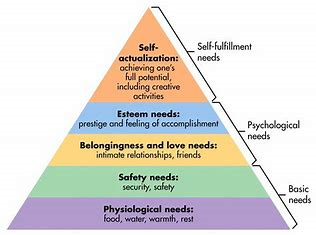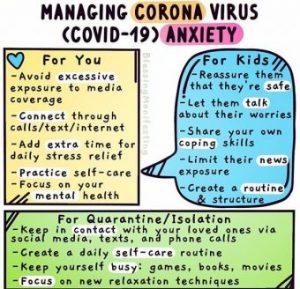
In these difficult and stressful times, it is very important not to be too hard on yourself. Everyone will be affected in their own way. For some, throwing themselves into work will be an effective and protective response. For others, the thought of working at home will be daunting and perhaps even overwhelming. Similarly, of those who are parents, some may feel extremely able to assume the role of teacher to their children, whereas others will feel that they have no idea where to start, even if they work in a school! What is almost certain is that each person will have ups and downs, with some days easier to manage than others.
Please remember that, whatever your response is to this situation, it is entirely valid for you to feel the way you do and for others to have their own, perhaps different, response.
Whether you are living on your own or with other people, it is important that you look after yourself in order that you are in a position to effectively interact with others, whether that is virtually or face-to-face within a household:
“Put on your own oxygen mask first”: In other words, “Take care of yourself”
When you travel on an aircraft, the flight crew instruct you to “put your own oxygen mask first before helping others”
Why do they tell you that?
Very simply, if you run out of oxygen, you won’t be in a position to help anyone else!
So.……first and foremost, be kind to yourself – and to others. Remember that everyone is having their own unique response to this situation, but remember too, the things that we all have in common:
Maslow’s Hierarchy of Needs

Maslow proposed that human needs can be organised into a hierarchy, which ranges from more concrete, basic needs eg. food, water and shelter, to more abstract concepts such as self-fulfilment. Originally, Maslow took the view that individuals move up the levels of the triangle as needs are met, although there is now agreement that movement upwards does not depend on all needs in a level being met as a prerequisite eg. there are those who feel a sense of belonging to a group of community and feel loved, who, at the same time, lack enough food.
A key message of the hierarchy however, is that if an individual’s core needs are not being met eg. food, shelter then it is less likely that they feel safe and secure and in turn, they are less likely to move further up the hierarchy. In developed countries, safety/security needs are most often highlighted in times of war or disaster eg. hurricanes, when even the prospect of basic needs being met becomes unpredictable.
This uncertain world of COVID-19 has created a similar situation and many people started off concerned that they would not be able to meet their own basic needs, which may go some way to explain the need people felt to stockpile and prepare for lockdown. People were and continue to be, worrying/feeling anxious not only about their own safety and security, in terms of catching and surviving the virus but also
that of their family and friends. Not only that, but the need for social distancing and, particularly, staying at home, has impacted on people’s sense of belonging and even their sense of being loved and being able to give love, notwithstanding the possibilities to interact through technology. Perhaps you recognise yourself in this?
Moving up the hierarchy, it can be hard to continue to feel good about yourself and feel that your contributions are valued and recognised when you are functioning within the current social parameters but it is important, if you can, to stand back and notice what you have been doing and the contribution you have been making. Set aside time for this and, again, if you can, find time to give feedback to others about their important and valuable contributions.
Please remember, that everyone will be at different stages in the hierarchy and that it is perfectly possible that people are moving up and down the hierarchy in terms of how they are feeling from day to day and week to week. You yourself, may be conscious that one week you are feeling okay and maybe even ready for a new challenge, heading towards the top of the hierarchy, where another week, you feel that all you can do is get up, eat and sleep and that you’re feeling anxious and isolated or lonely. Please reassure yourself that all of this is normal and allow yourself to be where you need to be – look after yourself now in order to protect your resilience now and in the future, as well as to put yourself in a position to understand and support others around you…..
The links below offer some ideas about how to look after yourself during this period. It is equally relevant to those self-isolating completely or those spending significantly more time at home than is usual:
Wellbeing pack for self isolation
Looking after yourself while working at home

Sleep
Remember sleep is a basic need. While you’re sleeping, your brain does its ‘tidying up’, allowing it to regroup and get ready for whatever the next day brings. Often, when you’re feeling stressed or anxious, your sleep is one of the first things to be adversely affected, yet we know that good sleep is fundamentally linked to positive wellbeing.
The Vagus nerve is the longest of your 12 cranial nerves, running from the brain through the heart to the gut. It is known for its role in your “rest and digest” system. Good vagal tone supports good sleep and helps your body deal with stress. View this link to demonstrate how activating the Vagus nerve can help you relax and get ready for sleep.
The Stress Response
When you’re faced with stressful events or situations, your body activates its ‘fight or flight’ response. Your heart races, your palms sweat, you ‘feel’ adrenaline coursing through you. When it all gets too much, you might ‘flip your lid’. This link helps explain your brain’s response to stress
When you’re faced with stressful events or situations, your body activates its ‘fight or flight’ response. Your heart races, your palms sweat, you ‘feel’ adrenaline coursing through you. When it all gets too much, you might ‘flip your lid’. This video below helps explain your brain’s response to stress.
Breathing Techniques
Try out some breathing exercises by clicking on the link here. The different breathing techniques have many purposes, not necessarily for reducing stress but for use in different situations
Healthy Eating
With ‘Looking after you’ comes eating well, click on this link to discover some quick and tasty recipes.

